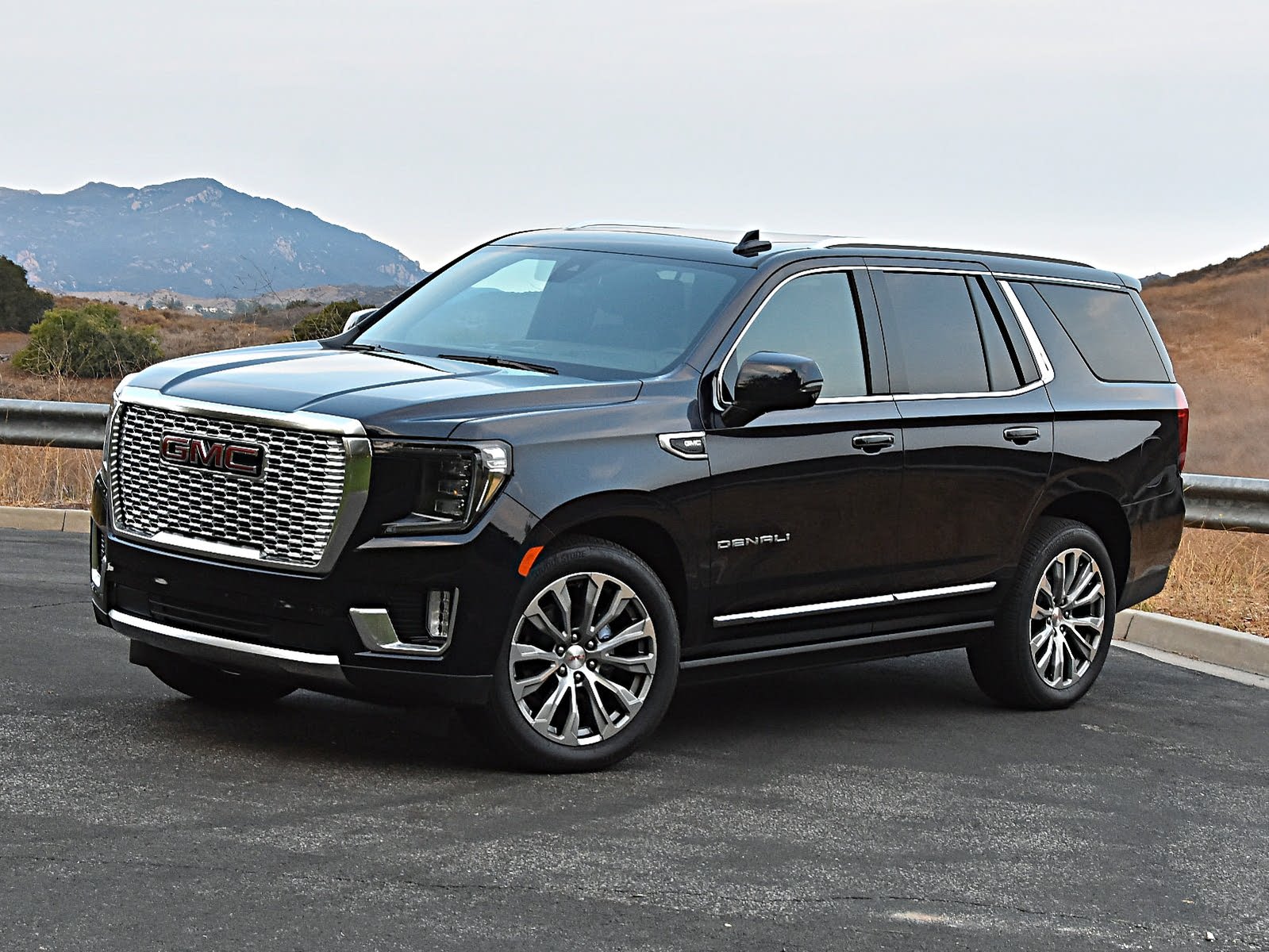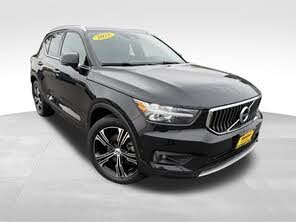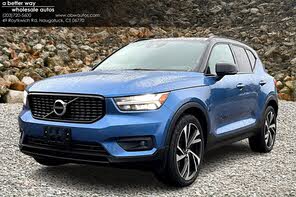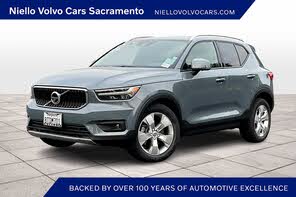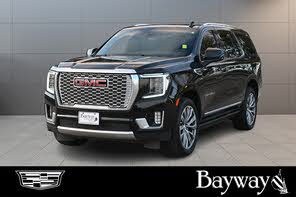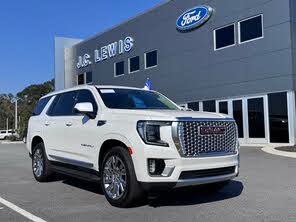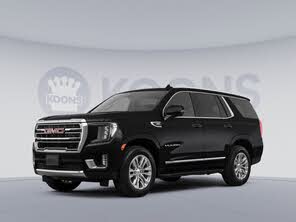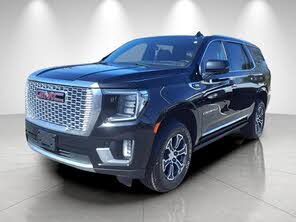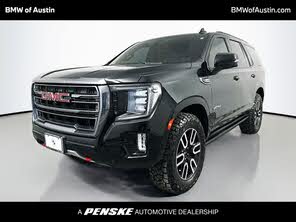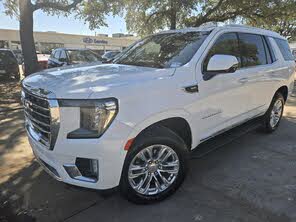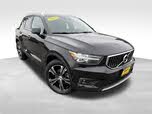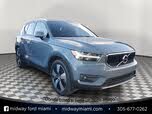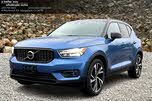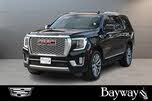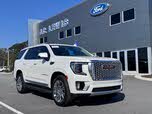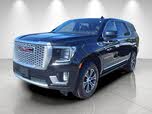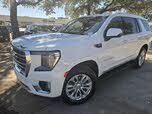2021 Volvo XC40 vs 2021 GMC Yukon
Overview | |
MSRP$51,000 | MSRP$33,700 |
Listings1453 | Listings158 |
Ratings & Reviews | |
User Reviews | User Reviews |
Expert reviews7.7 out of 10 | Expert reviews8.0 out of 10 |
Pros
Cons
| Pros
Cons
|
2021 GMC Yukon Reviews SummaryWith the redesigned 2021 GMC Yukon, several good things happen. First, GMC improves passenger space and cargo space by stretching the wheelbase and switching to an independent rear suspension design. Second, those same changes, coupled with a new adaptive air suspension option, enhance the full-size SUV’s ride and handling. Third, payload ratings rise by as much as 100 pounds. Fourth, the Yukon gets a significant technology upgrade. But at the same time, the new Yukon takes a couple of steps backward. Tow ratings can’t match the outgoing Yukon, and in some cases, fuel economy numbers worsen rather than improve. Still, all things considered, the new 2021 Yukon represents advancement. | |
2021 Volvo XC40 Reviews SummaryIntroduced for the 2019 model year, the Volvo XC40 enters 2021 with one major change—the addition of an all-electric powertrain option. The 2021 Volvo XC40 Recharge is the Swedish automaker’s first mass-market electric vehicle, in fact. The Recharge will be sold alongside gasoline versions of the XC40, which carry over largely unchanged, and compete against small luxury crossovers like the Audi Q3, BMW X1, Mercedes-Benz GLA-Class, and Lexus UX. With its electric powertrain, the Recharge is a de facto Tesla Model Y competitor. It’s also priced similar to high-end versions of the Ford Mustang Mach-E, although the two electric crossovers have somewhat different philosophies. In addition to that zero-emission powertrain, the Recharge gets an Android-based operating system, over-the-air (OTA) software update capability for all vehicle systems, and some updates to driver-assist tech. These changes don’t apply to gasoline 2021 XC40 models, but Volvo does plan to add the Android operating system to more vehicles in the future. Since the Recharge is the main new thing for the 2021 XC40, that’s what we focused on for this review. While the gasoline XC40 is available in three trim levels—Momentum, R-Design, and Inscription—with front-wheel drive (FWD) or all-wheel drive (AWD), the Recharge is only offered in a single trim level, with standard AWD. | |
No video found | No video found |
Popular Features & Specs | |
Engine5.3L 355 hp V8 | Engine2.0L 187 hp I4 |
Drive Train4X2 | Drive TrainFWD |
Seating Capacity9 | Seating Capacity5 |
Horsepower355 hp @ 5600 rpm | Horsepower187 hp @ 4700 rpm |
MPG City15 | MPG City23 |
MPG Highway20 | MPG Highway32 |
Engine | |
Engine Name5.3L 355 hp V8 | Engine Name2.0L 187 hp I4 |
Torque383 lb-ft @ 4100 rpm | Torque221 lb-ft @ 1400 rpm |
Horsepower355 hp @ 5600 rpm | Horsepower187 hp @ 4700 rpm |
Drivetrain4X2 | DrivetrainFWD |
Fuel Economy | |
MPG City15 | MPG City23 |
MPG Highway20 | MPG Highway32 |
Interior | |
Leather Seats | Leather SeatsStandard |
Seating Capacity9 | Seating Capacity5 |
Safety | |
Front Crash Overall4 | Front Crash Overall5 |
Side Crash Overall5 | Side Crash Overall5 |
Dimensions & Capacity | |
Cargo Space25.5 cu ft | Cargo Space20.7 cu ft |
Curb Weight5490 lbs | Curb Weight3627 lbs |
Height76.5 in | Height65.3 in |
Length210.0 in | Length174.2 in |
Width81.0 in | Width80.1 in |
Wheelbase120.9 in | Wheelbase106.4 in |
Maximum Payload1792 lbs | Maximum Payload1133 lbs |
Number of doors4 | Number of doors4 |
Maximum Towing Capacity8400 lbs | Maximum Towing Capacity3500 lbs |
Standard Towing Capacity7900 lbs | Standard Towing Capacity |
Overview | ||
MSRP | $51,000 | $33,700 |
Listings | ||
Ratings & Reviews | ||
User reviews | ||
Expert reviews | 7.7 out of 10Read full review | 8.0 out of 10Read full review |
Pros & cons | Pros
Cons
| Pros
Cons
|
Summary | With the redesigned 2021 GMC Yukon, several good things happen. First, GMC improves passenger space and cargo space by stretching the wheelbase and switching to an independent rear suspension design. Second, those same changes, coupled with a new adaptive air suspension option, enhance the full-size SUV’s ride and handling. Third, payload ratings rise by as much as 100 pounds. Fourth, the Yukon gets a significant technology upgrade. But at the same time, the new Yukon takes a couple of steps backward. Tow ratings can’t match the outgoing Yukon, and in some cases, fuel economy numbers worsen rather than improve. Still, all things considered, the new 2021 Yukon represents advancement. | Introduced for the 2019 model year, the Volvo XC40 enters 2021 with one major change—the addition of an all-electric powertrain option. The 2021 Volvo XC40 Recharge is the Swedish automaker’s first mass-market electric vehicle, in fact. The Recharge will be sold alongside gasoline versions of the XC40, which carry over largely unchanged, and compete against small luxury crossovers like the Audi Q3, BMW X1, Mercedes-Benz GLA-Class, and Lexus UX. With its electric powertrain, the Recharge is a de facto Tesla Model Y competitor. It’s also priced similar to high-end versions of the Ford Mustang Mach-E, although the two electric crossovers have somewhat different philosophies. In addition to that zero-emission powertrain, the Recharge gets an Android-based operating system, over-the-air (OTA) software update capability for all vehicle systems, and some updates to driver-assist tech. These changes don’t apply to gasoline 2021 XC40 models, but Volvo does plan to add the Android operating system to more vehicles in the future. Since the Recharge is the main new thing for the 2021 XC40, that’s what we focused on for this review. While the gasoline XC40 is available in three trim levels—Momentum, R-Design, and Inscription—with front-wheel drive (FWD) or all-wheel drive (AWD), the Recharge is only offered in a single trim level, with standard AWD. |
Video | No video found | No video found |
Popular Features & Specs | ||
Engine | 5.3L 355 hp V8 | 2.0L 187 hp I4 |
Drive Train | 4X2 | FWD |
Seating Capacity | 9 | 5 |
Horsepower | 355 hp @ 5600 rpm | 187 hp @ 4700 rpm |
MPG City | 15 | 23 |
MPG Highway | 20 | 32 |
Engine | ||
Engine Name | 5.3L 355 hp V8 | 2.0L 187 hp I4 |
Torque | 383 lb-ft @ 4100 rpm | 221 lb-ft @ 1400 rpm |
Horsepower | 355 hp @ 5600 rpm | 187 hp @ 4700 rpm |
Drivetrain | 4X2 | FWD |
Fuel Economy | ||
MPG City | 15 | 23 |
MPG Highway | 20 | 32 |
Interior | ||
Leather Seats | Standard | |
Seating Capacity | 9 | 5 |
Safety | ||
Front Crash Overall | 4 | 5 |
Side Crash Overall | 5 | 5 |
Dimensions & Capacity | ||
Cargo Space | 25.5 cu ft | 20.7 cu ft |
Curb Weight | 5490 lbs | 3627 lbs |
Height | 76.5 in | 65.3 in |
Length | 210.0 in | 174.2 in |
Width | 81.0 in | 80.1 in |
Wheelbase | 120.9 in | 106.4 in |
Maximum Payload | 1792 lbs | 1133 lbs |
Number of doors | 4 | 4 |
Maximum Towing Capacity | 8400 lbs | 3500 lbs |
Standard Towing Capacity | 7900 lbs | |
The 2021 GMC Yukon was a full-size SUV that balanced ruggedness with refinement, positioning itself between Chevrolet and Cadillac in the General Motors lineup. It was available in standard and extended-length body styles and came in SLE, SLT, AT4, and Denali trims. The Yukon AT4 was new for 2021, designed for off-road adventures with features like an improved approach angle, skid plates, and all-terrain tires. However, the Denali trim was the most popular, offering a more upscale experience with a unique dashboard design, real wood trim, leather-wrapped panels, and a panoramic sunroof. The Denali Ultimate package added even more luxury, though it came at a high price.
The 2021 Volvo XC40 had a more traditional SUV styling with a tall, flat roof and upright rear hatch. It featured familial styling cues like “Thor’s Hammer” LED headlights and a simple oval grille. The XC40 Recharge, the electric variant, had a blanked-off grille, subtle “Recharge” badging, and model-specific alloy wheels. It also had a gloss black roof and mirror caps, a slightly different rear bumper, and a model-exclusive color—Sage Green Metallic. The interior was minimalist yet premium, with high-quality materials like Nappa leather and Nubuck textile. The design was coherent, with every element melding together into a pleasing whole.


















The 2021 GMC Yukon offered three engine options. The standard engine for all but the Denali was a 355-horsepower 5.3-liter V8. The Denali came with a 420-horsepower 6.2-liter V8, providing robust acceleration and a V8 burble at idle. A 3.0-liter turbo-diesel inline six-cylinder engine was also available for every Yukon except the AT4. The Denali's 6.2-liter V8, paired with a ten-speed automatic transmission, delivered 420 horsepower at 5,600 rpm and 460 lb-ft of torque at 4,100 rpm. However, fuel economy was not its strong suit, averaging 14.4 mpg on a testing loop and 16.2 mpg on a shorter loop. The Yukon’s new independent rear suspension and available Four-Corner Air Ride suspension improved ride quality and handling. The Active Response 4WD system, with an Autotrac two-speed transfer case and electronic limited-slip differential, enhanced cornering performance and traction.
The 2021 Volvo XC40 had a three-tiered powertrain lineup, with the electric Recharge on top. The base FWD T4 had a 2.0-liter turbo four-cylinder engine with 187 horsepower and 221 lb-ft of torque. The AWD T5 had 248 horsepower and 258 lb-ft. The Recharge, sharing its powertrain with the Polestar 2, had one electric motor for each axle, providing AWD and a combined 402 horsepower and 486 lb-ft. The Recharge’s 78-kilowatt-hour battery pack enabled a 0-60 mph time of 4.7 seconds. The T5 and T4 had 0-60 mph times of 6.1 and 8.1 seconds, respectively. The Recharge emphasized quiet and comfort over speed, with excellent ride quality even on winter-ravaged roads. It also featured one-pedal driving and a towing capacity of 2,000 pounds.
The 2021 GMC Yukon benefited from a new independent rear suspension, significantly improving passenger and cargo space. The front seats were leather-upholstered with perforated inserts and special stitching, but they felt hard during long drives. The second-row seats slid and collapsed to fold flat, improving comfort and cargo room. The third-row seat provided actual thigh support, making it comfortable for adults. Cargo volume was impressive, with 25.5 cubic feet behind the third row, 72.6 cubic feet with the third row folded, and a maximum of 122.9 cubic feet.
The 2021 Volvo XC40 Recharge had no difference in passenger or cargo space compared to gasoline models. However, it had less legroom and headroom than competitors like the Tesla Model Y and Ford Mustang Mach-E. The cargo area was also smaller, and the frunk was tiny. The gasoline XC40 was more competitive in interior space compared to rivals like the Audi Q3 and BMW X1. Volvo compensated for the lack of space with clever storage solutions, such as a removable trash bin in the center console, a bag hook in the glovebox door, and extra-large door bins. The storage cubby ahead of the shifter was well-shaped to hold a phone, and a wireless charging pad was optional.
The 2021 GMC Yukon Denali with the Ultimate Package offered a 10.2-inch touchscreen infotainment system with wireless Apple CarPlay, wireless Android Auto, Amazon Alexa integration, and access to a 4G LTE WiFi hotspot. Upgrades included wireless device charging, a navigation system, a 14-speaker Bose Performance Series audio system, and a Rear Seat Media system with dual 12.6-inch touchscreen displays. The Yukon also featured a 15-inch color head-up display, a rear camera mirror, and multiple surround-view camera vantage points.
The 2021 Volvo XC40 Recharge featured the Android Automotive OS infotainment system, which included Google Assistant and Google Maps. The system also supported Apple CarPlay, Android Auto, and Bluetooth hands-free phone connectivity. The standard hardware setup included a 9-inch touchscreen and a 12.3-inch digital instrument cluster. The Recharge model had OTA update capability, allowing for updates to any vehicle function controlled by software. It also lacked a start button, instead using a key fob for entry and shifting out of park.
The 2021 GMC Yukon came with numerous advanced driving assistance systems (ADAS). Standard features included forward collision warning, daytime pedestrian detection, automatic emergency braking, and automatic high-beam headlights. Starting with SLT trim, the SUV included blind-spot warning, rear cross-traffic warning, lane-departure warning, and lane-keeping assistance. The Denali trim added adaptive cruise control and enhanced automatic emergency braking. The ADAS operated smoothly, making the Yukon more maneuverable and safer to drive.
The gasoline 2021 Volvo XC40 received the highest “Top Safety Pick+” rating from the IIHS and a five-star overall crash-test rating from the NHTSA. The electric XC40 Recharge had a safety cage around the battery and a redesigned front crash structure. Standard safety features included lane-keep assist, blind-spot monitoring, automatic emergency braking, and rear parking sensors. Optional features included traffic-sign recognition, reverse automatic emergency braking, and Volvo’s Pilot Assist driver-assistance system. The Recharge model also had a scalable sensor suite for future advanced driver aids.
CarGurus highlights

According to CarGurus experts, the overall rating for the 2021 GMC Yukon was 7.7 out of 10, while the 2021 Volvo XC40 scored 8.0 out of 10. Based on these ratings, the 2021 Volvo XC40 is the better choice, offering a more refined and technologically advanced experience.
Choose the 2021 Volvo XC40 if:
- You prefer a more traditional luxury SUV with a minimalist interior.
- You are interested in an electric vehicle with excellent ride quality and one-pedal driving.
- You value clever storage solutions and advanced Google-based infotainment.
Choose the 2021 GMC Yukon if:
- You need a full-size SUV with substantial cargo and passenger space.
- You prefer a rugged yet refined vehicle with off-road capabilities.
- You want advanced driving assistance systems and a comprehensive infotainment package.
CarGurus highlights

According to CarGurus experts, the overall rating for the 2021 GMC Yukon was 7.7 out of 10, while the 2021 Volvo XC40 scored 8.0 out of 10. Based on these ratings, the 2021 Volvo XC40 is the better choice, offering a more refined and technologically advanced experience.
Choose the 2021 Volvo XC40 if:
Shop Now- You prefer a more traditional luxury SUV with a minimalist interior.
- You are interested in an electric vehicle with excellent ride quality and one-pedal driving.
- You value clever storage solutions and advanced Google-based infotainment.
Choose the 2021 GMC Yukon if:
Shop Now- You need a full-size SUV with substantial cargo and passenger space.
- You prefer a rugged yet refined vehicle with off-road capabilities.
- You want advanced driving assistance systems and a comprehensive infotainment package.

By: CarGurus + AI
At CarGurus, our team of experienced automotive writers remain at the heart of our content operation, conducting hands-on car tests and writing insightful guides that are backed by years of industry experience. To complement this, we are harnessing AI to make our content offering more diverse and more helpful to shoppers than ever. To achieve this, our AI systems are based exclusively on CarGurus content, ratings and data, so that what we produce is both unique to CarGurus, and uniquely helpful to car shoppers.
